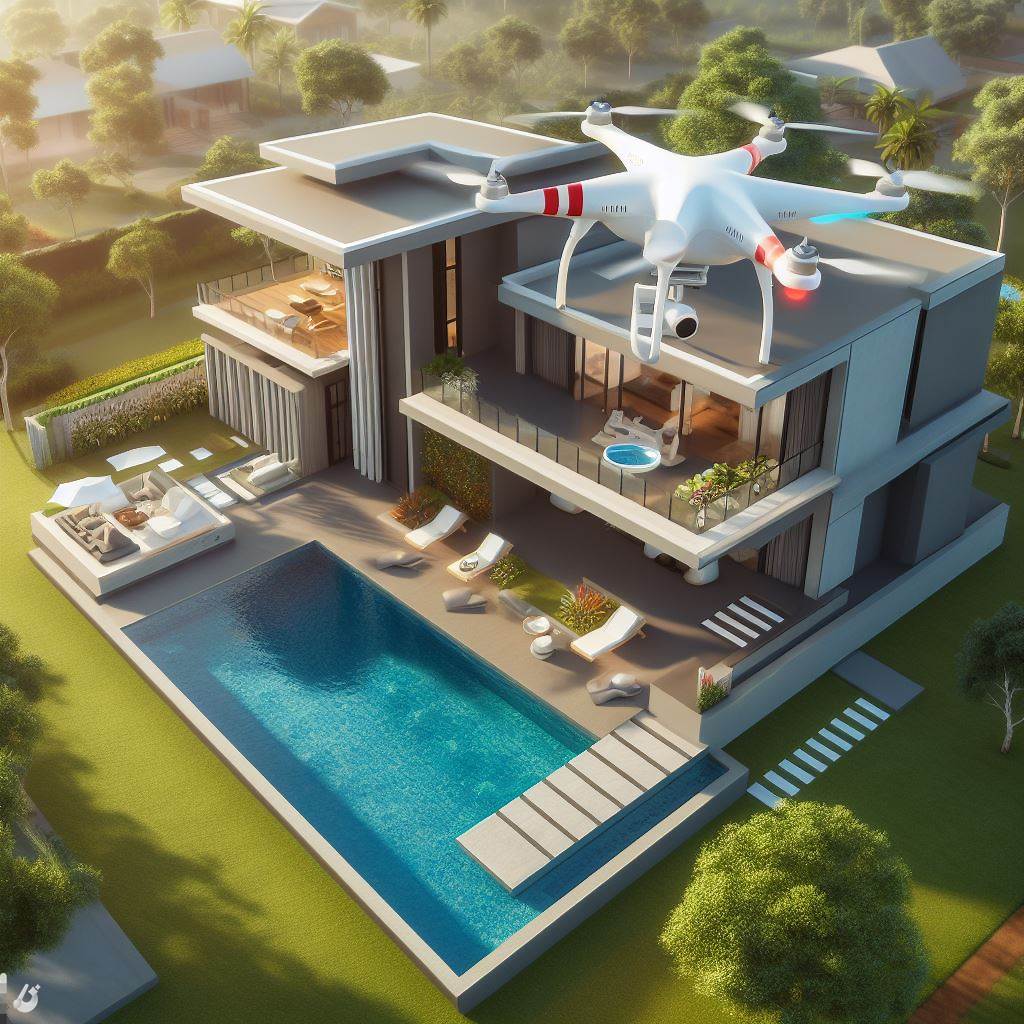Introduction
A. Brief Explanation of Smart Homes
Smart homes integrate cutting-edge technology to enhance residents’ quality of life, offering automated control over various aspects like security, lighting, and climate.
B. Importance of Real Estate Tech in the Future
In the ever-evolving real estate landscape, technology plays a pivotal role in shaping trends, influencing buyer preferences, and improving property management efficiency.
C. Thesis Statement: Smart Homes are the Future of Real Estate Tech
- Seamless Integration: Smart homes seamlessly integrate technology for a more connected and efficient living experience.
- Energy Efficiency: Automation fosters energy-efficient practices, aligning with the growing focus on sustainable living.
- Enhanced Security: Advanced security features, like smart surveillance and remote monitoring, redefine the concept of home safety.
- Increased Property Value: Homes equipped with smart technology often see an increase in market value, reflecting the demand for modern amenities.
- Personalization: Smart homes cater to individual preferences, offering a personalized and adaptive environment, shaping the future of real estate technology.
Advantages of Smart Homes
Smart homes offer a myriad of advantages for homeowners.
These modern residences harness the power of technology to enhance convenience, comfort, energy efficiency, and security.
A. Convenience and comfort
One of the primary benefits of smart homes is the convenience and comfort they provide. Automated systems eliminate the need for manual control, saving time and effort in performing daily tasks.
With just a few taps on a smartphone or voice commands, homeowners can control various aspects of their homes and manage them remotely.
This means they can turn on the lights, adjust the temperature, or even start the coffee maker before they arrive home.
B. Energy efficiency
Energy efficiency is another significant advantage of smart homes. Smart thermostats can learn occupants’ behaviors and adjust temperature settings accordingly, optimizing energy usage and reducing utility bills.
These systems can also be programmed to automatically adjust the temperature when no one is home, further saving energy.
Energy monitoring systems provide real-time data on energy consumption, allowing homeowners to identify energy-hungry appliances and make necessary changes to reduce their environmental impact.
C. Enhanced security
Enhanced security is a crucial aspect of smart homes. Smart locks and surveillance cameras provide an added layer of protection against unauthorized entry.
Homeowners can remotely lock and unlock doors, view live camera feeds, receive notifications of any suspicious activities, and even communicate with visitors through their smartphones.
Intrusion detection systems utilize sensors and advanced technology to alert homeowners of any potential security breaches in real-time, allowing them to take immediate action if necessary.
Apart from convenience, comfort, energy efficiency, and enhanced security, smart homes also offer additional benefits such as accessibility for people with disabilities.
Automated systems can be programmed to accommodate specific needs, making everyday tasks more manageable for individuals with limited mobility or other disabilities.
Furthermore, smart homes can help homeowners save money in the long run.
Energy-efficient devices and systems contribute to lower utility bills, while remote control features ensure optimal usage of resources.
Additionally, smart homes can increase the overall value of a property, making it more appealing to potential buyers in the future.
In essence, the advantages of smart homes are numerous. From convenience and comfort to energy efficiency and enhanced security, these tech-driven residences are revolutionizing the way we live.
With the continuous advancements in technology, smart homes are undoubtedly the future of real estate.
Read: AI in Real Estate: Trends and Predictions
Impact on Real Estate Industry
The rise of smart homes has significantly impacted the real estate industry, shaping buyer preferences, marketing strategies, and the roles of professionals in the field.
A. Increased demand for smart homes
1. Attracting tech-savvy buyers
With the advancement of technology, a new demographic of buyers is emerging – those who value convenience and automation.
Smart homes, equipped with features like automated lighting systems, voice assistants, and security systems, appeal to these tech-savvy individuals.
2. Improving property value
The integration of smart home technologies can significantly enhance the value of a property.
Homebuyers are willing to pay a premium for homes with advanced technology features already installed.
This increased demand for smart homes has led to a rise in prices within the real estate market.
B. Changes in real estate marketing
1. Smart home features
Real estate agents and marketers now need to emphasize the smart home aspects of a property to attract potential buyers.
They emphasize features like smart thermostats, energy-efficient appliances, and integrated entertainment systems to showcase the benefits of living in a smart home.
2. Utilizing technological marketing strategies
Traditional marketing methods are no longer enough.
Real estate professionals are embracing technological advancements, including virtual tours, interactive floor plans, and social media campaigns.
These strategies allow buyers to experience smart home features remotely and increase the property’s visibility to a wider audience.
C. Growing role of real estate tech professionals
1. Integrating smart home technologies
Real estate tech professionals play a vital role in integrating smart home technologies into properties.
From selecting and installing devices to ensuring proper connectivity and functionality, these experts ensure that the property embraces the concept of a smart home.
2. Providing tech support and consultations
As smart home systems become more complex, buyers seek advice and support from real estate tech professionals.
These professionals provide guidance on device compatibility, security measures, and future upgrades, making the transition to a smart home easier for buyers.
In essence, the emergence of smart homes has had a transformative impact on the real estate industry.
The increased demand for smart homes has attracted tech-savvy buyers and improved property values.
Real estate marketing strategies have adapted to highlight smart home features, while professionals in the industry now play an integral role in integrating and supporting these technologies.
As technology continues to advance, the future of real estate tech holds exciting possibilities for both buyers and sellers.
Read: Blockchain’s Role in Real Estate Transactions

Challenges and Concerns in the Smart Home Revolution
The allure of smart homes is undeniable, but as with any technological revolution, challenges and concerns emerge.
Addressing these issues head-on is crucial for the sustained growth and widespread adoption of smart home technology.
A. Cost
The financial barrier is a significant challenge. The initial investment required for smart home devices and systems can be a deterrent for many homeowners.
While the prices of these technologies are gradually decreasing, the upfront cost remains a hurdle.
Maintenance expenses are often underestimated. Smart devices require regular updates, and malfunctioning components may need replacement.
These ongoing costs, when accumulated, can strain the financial resources of homeowners, potentially overshadowing the perceived benefits of a smart home.
B. Privacy and Security Issues
The digitization of homes raises concerns about the privacy and security of personal data.
Potential data breaches can expose sensitive information, compromising the safety of residents.
As smart home systems become more interconnected, the risk of unauthorized access and hacking increases, posing a direct threat to the well-being of homeowners.
C. Compatibility and Standardization
The lack of compatibility and standardization within the smart home ecosystem is a stumbling block.
Integration issues arise when trying to connect devices from different manufacturers.
This lack of cohesion not only impedes the user experience but also hampers the potential for a truly interconnected smart home environment.
Addressing these challenges requires collaboration among industry stakeholders.
Establishing industry-wide standards is paramount to ensuring that smart home devices work seamlessly together, providing a more accessible and user-friendly experience for homeowners.
By acknowledging and proactively resolving these challenges, the future of real estate tech can truly be shaped by the promise of smart homes.
Read: Virtual Home Tours: A New Era in Real Estate
Future Trends in Smart Homes
A. Artificial intelligence and machine learning
- Artificial intelligence (AI) and machine learning are set to become integral parts of smart homes.
- AI will enable homes to learn from user behavior and adapt to their preferences.
- Machine learning algorithms will analyze data to create personalized experiences for homeowners.
- Smart home devices will utilize AI to provide more intuitive and intelligent automation.
- AI-powered virtual assistants will become common in smart homes, capable of understanding and responding to voice commands.
B. Internet of Things (IoT) integration
- The Internet of Things (IoT) will continue to play a pivotal role in the future of smart homes.
- IoT devices will be seamlessly integrated within the home, enabling various devices to communicate and work together.
- Connected appliances, security systems, lighting, and thermostats will be controlled using a single dashboard or smartphone app.
- IoT integration will enable real-time monitoring and control of home devices, even from remote locations.
- Homeowners will benefit from increased energy efficiency, convenience, and enhanced security through IoT integration.
C. Voice-activated technology
- Voice-activated technology, such as virtual assistants, will become more prevalent in smart homes.
- Homeowners will be able to control various devices using voice commands, making interactions more seamless.
- Virtual assistants will provide information, perform tasks, and act as personal concierges within the home.
- Voice-activated technology will enable hands-free operation of smart home devices, enhancing convenience and accessibility.
- Advancements in natural language processing will make voice recognition more accurate and reliable.
D. Increased customization options
- Future smart homes will offer increased customization options to cater to individual needs and preferences.
- Homeowners will be able to configure their smart homes according to their lifestyle and requirements.
- Customization options will extend to lighting, climate control, security settings, and entertainment systems.
- Smart homes will adapt to individual preferences, creating personalized atmospheres and experiences.
- Increased customization options will provide homeowners with greater control and a sense of ownership over their smart homes.
In review, the future of smart homes is exciting and holds immense potential.
Artificial intelligence and machine learning will enhance the intelligence and automation capabilities of smart homes.
IoT integration will create a seamless network of interconnected devices, allowing for holistic control and monitoring.
Voice-activated technology will make interactions more natural and hands-free.
Increased customization options will empower homeowners to create personalized experiences.
Together, these trends will revolutionize the real estate tech industry and redefine the concept of modern living.
Read: Drone Photography: Changing Real Estate
Conclusion
A. Importance of smart homes in real estate tech
Smart homes have emerged as a crucial component of the real estate tech industry.
They offer numerous benefits and have the potential to transform the way properties are bought and sold.
B. Potential benefits and challenges
Smart home technology provides convenience, energy efficiency, and security, making it an attractive option for homeowners and buyers.
However, challenges such as privacy concerns and cost need to be addressed.
Encourage readers to explore and consider smart home technology in their real estate endeavors
C. Encouraging readers to explore and consider smart home technology in their real estate endeavors
As the real estate industry continues to evolve, it is essential for individuals involved in the sector to explore and consider incorporating smart home technology into their practices.
This will not only enhance their offerings but also meet the expectations of tech-savvy clients.
In closing, smart homes are undoubtedly the future of real estate tech.
With their potential to improve efficiency, security, and comfort, it is crucial for real estate professionals to embrace this technology to stay relevant and competitive in the market.




